中考语法—非谓语动词讲解(共28张PPT)
文档属性
| 名称 | 中考语法—非谓语动词讲解(共28张PPT) | 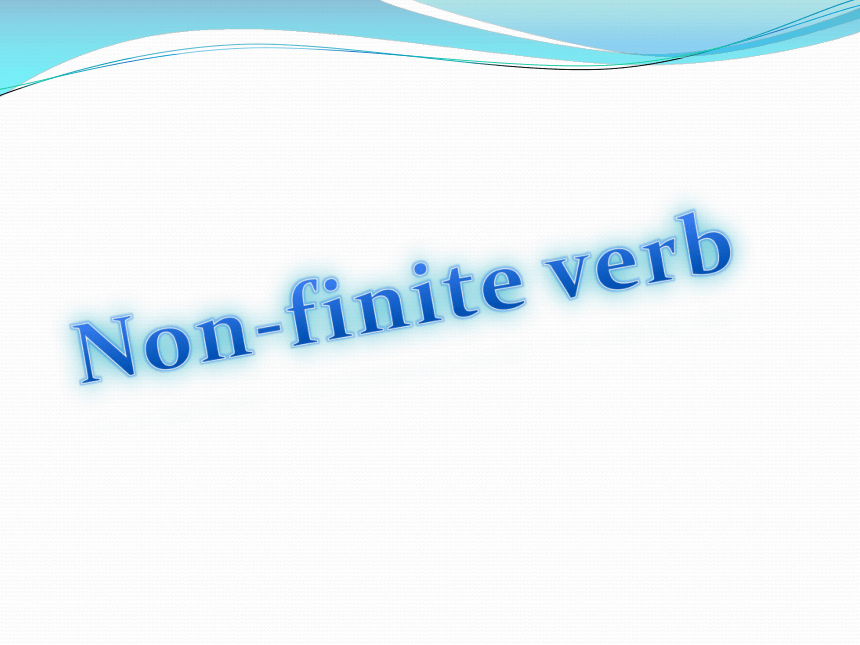 | |
| 格式 | zip | ||
| 文件大小 | 331.3KB | ||
| 资源类型 | 教案 | ||
| 版本资源 | 通用版 | ||
| 科目 | 英语 | ||
| 更新时间 | 2019-01-22 20:26:01 | ||
图片预览



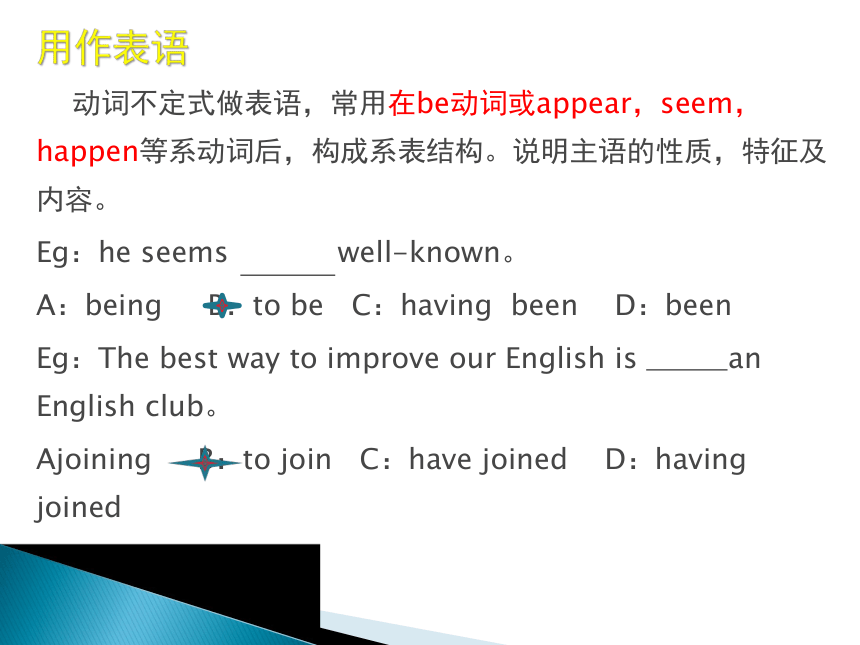
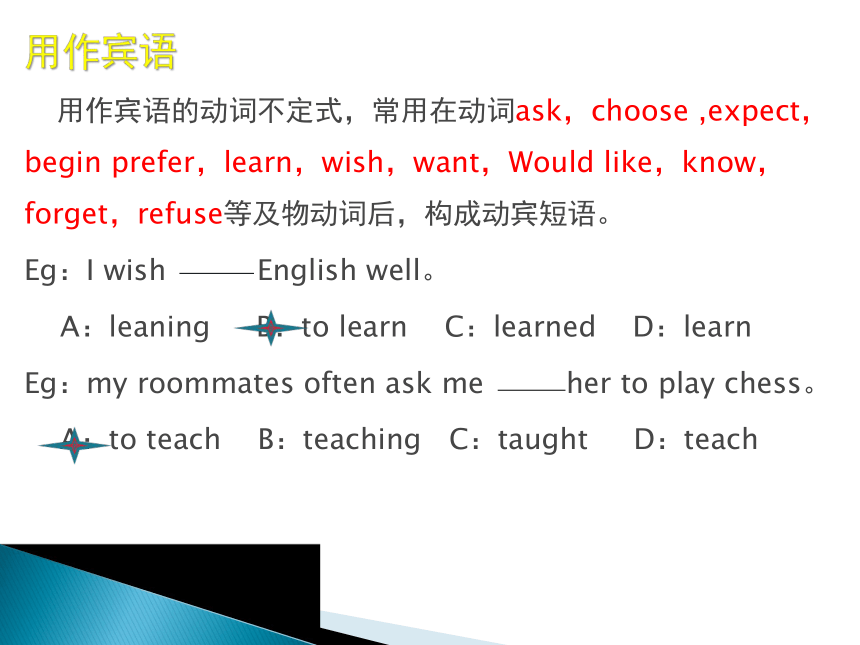
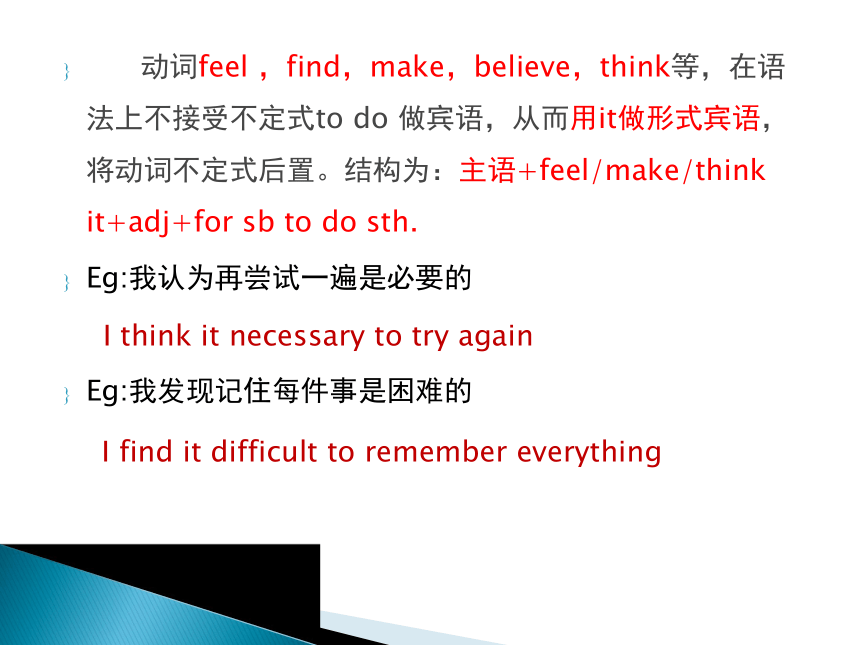

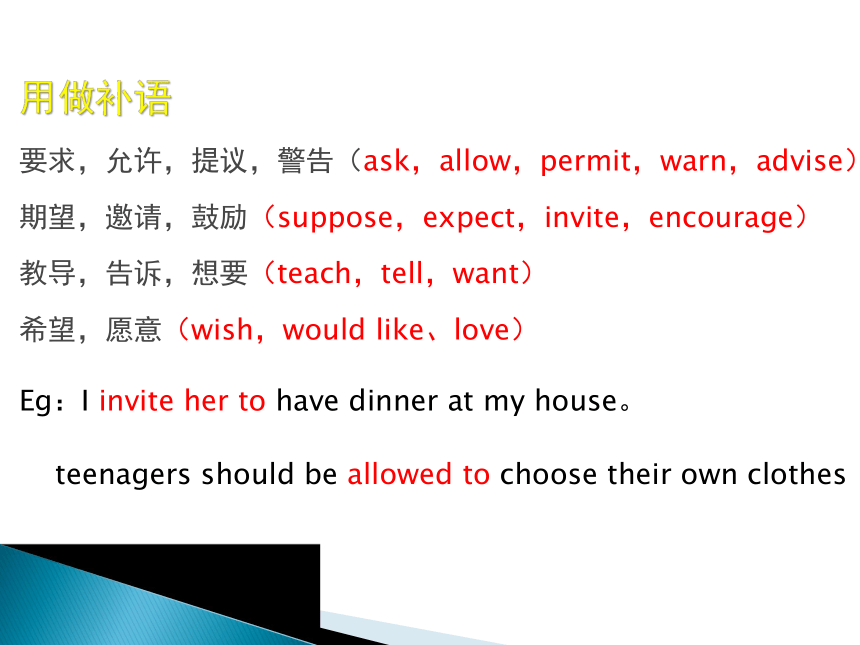
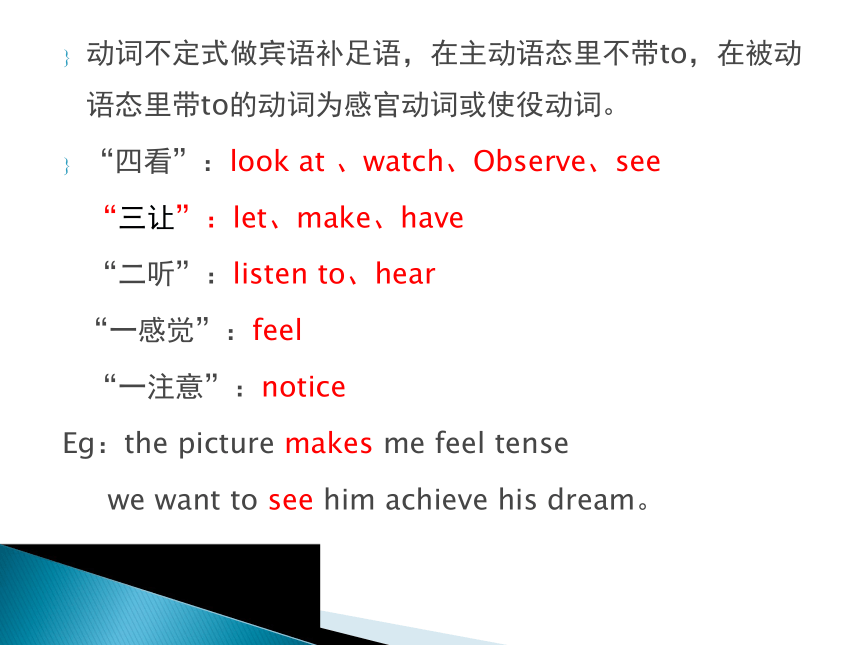
文档简介
课件28张PPT。Non-finite verb非谓语动词是指在句子中不是谓语的动词,主要包括不定式、动名词和分词(现在分词和过去分词),即动词的非谓语形式。非谓语动词除了不能独立作谓语外,可以承担句子的其他成分。
definition动词不定式是由“不定式符号to+动词原形”构成的一种非谓语动词结构。有些动词不定式不带to,其可以做主语,宾语,状语,定语,表语,补语或单独使用。
用作主语
1:动词不定式直接做主语,谓语动词用第三人称单数。
2:动词不定式做主语,常用it做形式主语,结构为:it is+adj+for sb to do sth。:
3:带疑问词的不定式短语做主语常置于句首。
动词不定式(to do)用作表语
动词不定式做表语,常用在be动词或appear,seem,happen等系动词后,构成系表结构。说明主语的性质,特征及内容。
Eg:he seems well-known。
A:being B:to be C:having been D:been
Eg:The best way to improve our English is an English club。
Ajoining B:to join C:have joined D:having joined 用作宾语
用作宾语的动词不定式,常用在动词ask,choose ,expect,begin prefer,learn,wish,want,Would like,know,forget,refuse等及物动词后,构成动宾短语。
Eg:I wish English well。
A:leaning B:to learn C:learned D:learn
Eg:my roommates often ask me her to play chess。
A:to teach B:teaching C:taught D:teach
动词feel ,find,make,believe,think等,在语法上不接受不定式to do 做宾语,从而用it做形式宾语,将动词不定式后置。结构为:主语+feel/make/think it+adj+for sb to do sth.
Eg:我认为再尝试一遍是必要的
Eg:我发现记住每件事是困难的
I think it necessary to try againI find it difficult to remember everything.用作定语
用作定语的动词不定式一般都位于被修饰的名词之后。
Eg:I have so much homework to do today。
I can’t think of any good advice to give her。
通常chance,place,time,way等名词后接不定式做定语,另外在the first,the only,the second,the last等词后,也常用不定式做定语。
Eg:he needs time to do homework。
you are the first man to arrive at there。 用做补语
要求,允许,提议,警告(ask,allow,permit,warn,advise)
期望,邀请,鼓励(suppose,expect,invite,encourage)
教导,告诉,想要(teach,tell,want)
希望,愿意(wish,would like、love)
Eg:I invite her to have dinner at my house。
teenagers should be allowed to choose their own clothes
动词不定式做宾语补足语,在主动语态里不带to,在被动语态里带to的动词为感官动词或使役动词。
“四看”:look at 、watch、Observe、see
“三让”:let、make、have
“二听”:listen to、hear
“一感觉”:feel
“一注意”:notice
Eg:the picture makes me feel tense
we want to see him achieve his dream。Help 后面接动词不定式做宾语补足语,带to表间接帮助,不带to表直接帮助。在被动语态里或动词不定式否定式做补语时要带to。
Eg:Using e-mail English helps you write quickly。
Be said、be sure、seem、happen等词后可以接动词不定式做宾语补足语。
Eg:he doesn’t seem to have many friends。
用作状语
目的状语,置于句首或句末,置于句首表强调,为加强语气。常与in order或so as 组成短语。置于句首只用to do或in order to do。
结果状语,多见于“too..to..或enough to..” 结构中。
原因状语,多见于“sb +be+adj+to do”结构中。
独立动词不定式多用作插入语,表示说话人的心理状态或对事件的看法。
Eg:I’d like to keep healthy,but to be honest,I only eat the food tastes good.
带疑问词的不定式短语
动词不定式前可以带疑问词,what、which、who或疑问副词why、how、when,where等,这种结构起名词作用,在句中做主语,宾语,表语或单独使用。Why后面不定式不带to。
Eg:I don’t know what to do next。
where to go is not decided yet。
what to do next?
1:使役动词have、make、Let后接不定式。
2:would rather、had better后。
3:why..或why not 后。
4:感官动词后。省略to的不定式语法特征
时态的确定:判断与句子谓语动词发生的先后关系。
语态的确定:看动名词与句中逻辑主语的关系。
用作主语(动名词做主语谓语动词用单数)直接位于句首做主语
Eg:在夏天,游泳是我最喜欢的运动。
Eg:爬山真有趣。
用it做形式主语,真正主语置于句尾做后置主语。
it is no use/no good+doing(做…是没有用处的)
it is a waste of time+doing(做…是浪费时间)
it is hard+doing(做…很艰难)
it is fun +doing(做…很有趣)
Swimming is my favorite sport in summer。Climbing mountains is really fun用作宾语做动词的宾语
Eg:我很喜欢打篮球。
Eg:他不介意等我们。
做介词的宾语
Eg:我害怕失去这次珍贵的机会。
Eg:他擅长用英语写作。
I like playing basketball very much。He doesn’t mind waiting for us。I am afraid of losing this precious opportunityHe is adept at writing in English做表语动名词做表语时句子主语常表示无生命的事物的名词或what引导的名词性从句,表语动名词与主语是对等的关系,表示主语的内容。主语,表语位置可互换。
Eg:你的任务就是擦窗户
Eg:他的兴趣是弹钢琴。
Eg:我最痛恨的是被别人欺骗。
做定语(表示被修饰词的某种用途)
A walking stick=a stick for walking=a stick which is used to walking
A reading room=a room for reading =a room which is used to readingYour task is cleaning the windowsHis hobby is playing the piano。What I hate is being cheated by others只可接v-ing做宾语的喜欢、考虑、不可免(enjoy、consider、avoid)
坚持、想象,别介意(insist on、imagine、mind)
否认、放弃、该继续(deny、give up、go on)
承认、理解,很值得(admit、understand、be worth)
期待、完成,不推迟(look forward to、finish、put off)
建议、练习、别错过(advice、practice、miss)
习惯于:be used to 注意:pay attention to
指向:point to 转向:turn to
属于:belong to 等同:equal to
反对:object to可以接to do和doing,意义不同 to do忘记要做某事 to do开始做某事
doing忘记做了某事 doing停止做某事forgetstoprememberto do记得要做某事doing记得做过某事regretto dodoing遗憾要做某事后悔做过某事try努力做某事尝试做某事mean学会了做某事Like 、love、prefer、hate + to do表示具体行为+doing 表示抽象概念,如果这些动词前有should,则只能用to do。
Need、want、deserve + doing表被动含义
Eg:the clothes needs washing。
动词-ed形式的特征 1?:动词-ed形式表示已完成的动作。
The?books,?written?by?Lu?Xun,?are?popular?with?many?Chinese?people.?
2:及物动词的ed形式一般表示被动的意思。
Given?more?time,?I?could?have?solved?that?riddle.
3:不及物动词ed形式只表示完成的意义,并不带有被动的含义。
逃犯:an?escaped?prisoner?=a?prisoner?who?has?escaped?
动词-ed形式的功能 做表语(动词ed形式在连系动词后作表语,说明主语的状态)
Eg:The?students?are?fully?prepared.?
When?we?got?there,?the?shop?was?closed.
要把动词-ed形式作表语和被动语态区别开来。作表语的-ed形式表示状态,被动语态表示被动动作。
Eg:Peter?the?Great?is?buried?here.?
Peter?the?Great?was?buried?here?in?1725.
做宾语补足语 ? 在感觉动see,?hear,?feel,?notice,?watch,?find等后作宾语补足语。
我们发现所有的河流都被污染了。
在使役动词get,?have,?make,?leave,?keep等后作宾语补足语。
他提高他的音量以便让他自己听到。
We found all the rivers seriously pollutedHe raise his voice in order to make himself heard动词-ed形式也可用在with?(without)?结构中,作介词的宾语补足语。
每件事都安排好了,他离开了办公室。
如果不给更多时间,我们在三周内完成不了这个任务。
With everything well arranged,he left the office。Without any more time given,we can’t finish the task within three weeks。’某些动词后want,?need,?prefer,?would?like,作宾语补足语的不定式被动形式省“to?be”,就成了动词-ed形式作宾语补足语。
Eg:I?would?like?this?matter?(to?be)?settled?immediately.?
The?peasants?don't?want?good?farmland?(to?be)?built?on. 做定语 前置定语:单个动词-ed形式作定语一般放在被修饰的名词之前,作前置定语
Eg: When?we?arrived ,we?each?were?given?a?printed?question?paper. All?the?broken?doors?and?windows?have?been?repaired.?
后置定语:作后置定语的动词-ed形式一般都带有修饰语或其他成分,在语法上相当于一个定语从句。
Eg:We?have?read?many?novels?written?by?this?author.?
(=?that?are?written?by?this?author)?
做状语表示时间:动词-ed形式作状语表示时间,相当于一个时间状语从句。
Seen?from?the?tower,?the?city?looks?beautiful.=When?the?city?is?seen?from?the?tower,it is beautiful.
When?asked?why?she?was?late?for?class?again,?she?hung?her?head?in?shame.?
表示原因:动词-ed形式作状语表示原因,相当于一个原因状语从句。
Written?in?haste,?her?letter?is?very?hard?to?read.=As?it?was?written?in?haste, her?letter?is?very?hard?to?read
Excited?by?the?new?discovery,?we?decided?to?go?out?and?celebrate.= Because?we?were?excited?by the?new?discovery ,we?decided?to …. 表示条件:动词-ed形式作状语表示条件,相当于一个条件状语从句。
Heated,?water?changes?into?steam.
=If?water?is?heated, it would change into stream
Given?more?time,?he?would?be?able?to?do?better
=?If?he?was?given?more?time, he?would?be?able?to?do?better
为了使-ed形式表示的条件、动词让步意义更加明显,我们可以加上适当的连词。
Unless?invited,?he?will?not?come?back?to?the?company.?
definition动词不定式是由“不定式符号to+动词原形”构成的一种非谓语动词结构。有些动词不定式不带to,其可以做主语,宾语,状语,定语,表语,补语或单独使用。
用作主语
1:动词不定式直接做主语,谓语动词用第三人称单数。
2:动词不定式做主语,常用it做形式主语,结构为:it is+adj+for sb to do sth。:
3:带疑问词的不定式短语做主语常置于句首。
动词不定式(to do)用作表语
动词不定式做表语,常用在be动词或appear,seem,happen等系动词后,构成系表结构。说明主语的性质,特征及内容。
Eg:he seems well-known。
A:being B:to be C:having been D:been
Eg:The best way to improve our English is an English club。
Ajoining B:to join C:have joined D:having joined 用作宾语
用作宾语的动词不定式,常用在动词ask,choose ,expect,begin prefer,learn,wish,want,Would like,know,forget,refuse等及物动词后,构成动宾短语。
Eg:I wish English well。
A:leaning B:to learn C:learned D:learn
Eg:my roommates often ask me her to play chess。
A:to teach B:teaching C:taught D:teach
动词feel ,find,make,believe,think等,在语法上不接受不定式to do 做宾语,从而用it做形式宾语,将动词不定式后置。结构为:主语+feel/make/think it+adj+for sb to do sth.
Eg:我认为再尝试一遍是必要的
Eg:我发现记住每件事是困难的
I think it necessary to try againI find it difficult to remember everything.用作定语
用作定语的动词不定式一般都位于被修饰的名词之后。
Eg:I have so much homework to do today。
I can’t think of any good advice to give her。
通常chance,place,time,way等名词后接不定式做定语,另外在the first,the only,the second,the last等词后,也常用不定式做定语。
Eg:he needs time to do homework。
you are the first man to arrive at there。 用做补语
要求,允许,提议,警告(ask,allow,permit,warn,advise)
期望,邀请,鼓励(suppose,expect,invite,encourage)
教导,告诉,想要(teach,tell,want)
希望,愿意(wish,would like、love)
Eg:I invite her to have dinner at my house。
teenagers should be allowed to choose their own clothes
动词不定式做宾语补足语,在主动语态里不带to,在被动语态里带to的动词为感官动词或使役动词。
“四看”:look at 、watch、Observe、see
“三让”:let、make、have
“二听”:listen to、hear
“一感觉”:feel
“一注意”:notice
Eg:the picture makes me feel tense
we want to see him achieve his dream。Help 后面接动词不定式做宾语补足语,带to表间接帮助,不带to表直接帮助。在被动语态里或动词不定式否定式做补语时要带to。
Eg:Using e-mail English helps you write quickly。
Be said、be sure、seem、happen等词后可以接动词不定式做宾语补足语。
Eg:he doesn’t seem to have many friends。
用作状语
目的状语,置于句首或句末,置于句首表强调,为加强语气。常与in order或so as 组成短语。置于句首只用to do或in order to do。
结果状语,多见于“too..to..或enough to..” 结构中。
原因状语,多见于“sb +be+adj+to do”结构中。
独立动词不定式多用作插入语,表示说话人的心理状态或对事件的看法。
Eg:I’d like to keep healthy,but to be honest,I only eat the food tastes good.
带疑问词的不定式短语
动词不定式前可以带疑问词,what、which、who或疑问副词why、how、when,where等,这种结构起名词作用,在句中做主语,宾语,表语或单独使用。Why后面不定式不带to。
Eg:I don’t know what to do next。
where to go is not decided yet。
what to do next?
1:使役动词have、make、Let后接不定式。
2:would rather、had better后。
3:why..或why not 后。
4:感官动词后。省略to的不定式语法特征
时态的确定:判断与句子谓语动词发生的先后关系。
语态的确定:看动名词与句中逻辑主语的关系。
用作主语(动名词做主语谓语动词用单数)直接位于句首做主语
Eg:在夏天,游泳是我最喜欢的运动。
Eg:爬山真有趣。
用it做形式主语,真正主语置于句尾做后置主语。
it is no use/no good+doing(做…是没有用处的)
it is a waste of time+doing(做…是浪费时间)
it is hard+doing(做…很艰难)
it is fun +doing(做…很有趣)
Swimming is my favorite sport in summer。Climbing mountains is really fun用作宾语做动词的宾语
Eg:我很喜欢打篮球。
Eg:他不介意等我们。
做介词的宾语
Eg:我害怕失去这次珍贵的机会。
Eg:他擅长用英语写作。
I like playing basketball very much。He doesn’t mind waiting for us。I am afraid of losing this precious opportunityHe is adept at writing in English做表语动名词做表语时句子主语常表示无生命的事物的名词或what引导的名词性从句,表语动名词与主语是对等的关系,表示主语的内容。主语,表语位置可互换。
Eg:你的任务就是擦窗户
Eg:他的兴趣是弹钢琴。
Eg:我最痛恨的是被别人欺骗。
做定语(表示被修饰词的某种用途)
A walking stick=a stick for walking=a stick which is used to walking
A reading room=a room for reading =a room which is used to readingYour task is cleaning the windowsHis hobby is playing the piano。What I hate is being cheated by others只可接v-ing做宾语的喜欢、考虑、不可免(enjoy、consider、avoid)
坚持、想象,别介意(insist on、imagine、mind)
否认、放弃、该继续(deny、give up、go on)
承认、理解,很值得(admit、understand、be worth)
期待、完成,不推迟(look forward to、finish、put off)
建议、练习、别错过(advice、practice、miss)
习惯于:be used to 注意:pay attention to
指向:point to 转向:turn to
属于:belong to 等同:equal to
反对:object to可以接to do和doing,意义不同 to do忘记要做某事 to do开始做某事
doing忘记做了某事 doing停止做某事forgetstoprememberto do记得要做某事doing记得做过某事regretto dodoing遗憾要做某事后悔做过某事try努力做某事尝试做某事mean学会了做某事Like 、love、prefer、hate + to do表示具体行为+doing 表示抽象概念,如果这些动词前有should,则只能用to do。
Need、want、deserve + doing表被动含义
Eg:the clothes needs washing。
动词-ed形式的特征 1?:动词-ed形式表示已完成的动作。
The?books,?written?by?Lu?Xun,?are?popular?with?many?Chinese?people.?
2:及物动词的ed形式一般表示被动的意思。
Given?more?time,?I?could?have?solved?that?riddle.
3:不及物动词ed形式只表示完成的意义,并不带有被动的含义。
逃犯:an?escaped?prisoner?=a?prisoner?who?has?escaped?
动词-ed形式的功能 做表语(动词ed形式在连系动词后作表语,说明主语的状态)
Eg:The?students?are?fully?prepared.?
When?we?got?there,?the?shop?was?closed.
要把动词-ed形式作表语和被动语态区别开来。作表语的-ed形式表示状态,被动语态表示被动动作。
Eg:Peter?the?Great?is?buried?here.?
Peter?the?Great?was?buried?here?in?1725.
做宾语补足语 ? 在感觉动see,?hear,?feel,?notice,?watch,?find等后作宾语补足语。
我们发现所有的河流都被污染了。
在使役动词get,?have,?make,?leave,?keep等后作宾语补足语。
他提高他的音量以便让他自己听到。
We found all the rivers seriously pollutedHe raise his voice in order to make himself heard动词-ed形式也可用在with?(without)?结构中,作介词的宾语补足语。
每件事都安排好了,他离开了办公室。
如果不给更多时间,我们在三周内完成不了这个任务。
With everything well arranged,he left the office。Without any more time given,we can’t finish the task within three weeks。’某些动词后want,?need,?prefer,?would?like,作宾语补足语的不定式被动形式省“to?be”,就成了动词-ed形式作宾语补足语。
Eg:I?would?like?this?matter?(to?be)?settled?immediately.?
The?peasants?don't?want?good?farmland?(to?be)?built?on. 做定语 前置定语:单个动词-ed形式作定语一般放在被修饰的名词之前,作前置定语
Eg: When?we?arrived ,we?each?were?given?a?printed?question?paper. All?the?broken?doors?and?windows?have?been?repaired.?
后置定语:作后置定语的动词-ed形式一般都带有修饰语或其他成分,在语法上相当于一个定语从句。
Eg:We?have?read?many?novels?written?by?this?author.?
(=?that?are?written?by?this?author)?
做状语表示时间:动词-ed形式作状语表示时间,相当于一个时间状语从句。
Seen?from?the?tower,?the?city?looks?beautiful.=When?the?city?is?seen?from?the?tower,it is beautiful.
When?asked?why?she?was?late?for?class?again,?she?hung?her?head?in?shame.?
表示原因:动词-ed形式作状语表示原因,相当于一个原因状语从句。
Written?in?haste,?her?letter?is?very?hard?to?read.=As?it?was?written?in?haste, her?letter?is?very?hard?to?read
Excited?by?the?new?discovery,?we?decided?to?go?out?and?celebrate.= Because?we?were?excited?by the?new?discovery ,we?decided?to …. 表示条件:动词-ed形式作状语表示条件,相当于一个条件状语从句。
Heated,?water?changes?into?steam.
=If?water?is?heated, it would change into stream
Given?more?time,?he?would?be?able?to?do?better
=?If?he?was?given?more?time, he?would?be?able?to?do?better
为了使-ed形式表示的条件、动词让步意义更加明显,我们可以加上适当的连词。
Unless?invited,?he?will?not?come?back?to?the?company.?
同课章节目录
- 词法
- 名词
- 动词和动词短语
- 动词语态
- 动词时态
- 助动词和情态动词
- 非谓语动词
- 冠词
- 代词
- 数词和量词
- 形容词副词及其比较等级
- 介词和介词短语
- 连词和感叹词
- 构词法
- 相似、相近词比较
- 句法
- 陈述句
- 一般疑问句和否定疑问句
- 特殊疑问句及选择疑问句
- 反意疑问句
- 存在句(There be句型)
- 宾语从句
- 定语从句
- 状语从句
- 主谓一致问题
- 简单句
- 并列句
- 复合句
- 主谓一致
- 主、表语从句
- 名词性从句
- 直接引语和间接引语
- 虚拟语气
- 感叹句
- 强调句
- 倒装句
- 祈使句
- 句子的成分
- 句子的分类
- 题型专区
- 单项选择部分
- 易错题
- 完形填空
- 阅读理解
- 词汇练习
- 听说训练
- 句型转换
- 补全对话
- 短文改错
- 翻译
- 书面表达
- 任务型阅读
- 语法填空
- 其他资料
